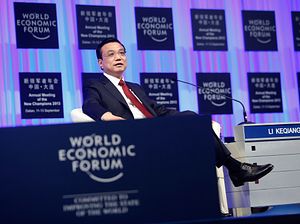Chinese Premier Li Keqiang’s speech to kick off this year’s World Economic Forum meeting in Dalian was heavy on assurances to the assembled attendees from the corporate world but was light on detail. The five main talking points of the speech break down as follows.
First, China pressed its case for global leadership. President Xi Jinping used a speech at the World Economic Forum’s January meeting — timed just prior to Donald Trump’s inauguration in the United States — as a platform to push forward China’s claim for leadership of globalization. Li’s speech continued this mantle by advocating international competition in contrast to the anti-free trade rhetoric presented by the Trump administration.
Second, Li emphasized free trade, but with Chinese characteristics. Extending on his pro-globalization positioning, Li’s WEF speech extolled the virtues of free trade and promised further opening up of China’s services and manufacturing sectors but gave no details. This amounted to less than was hoped for, particularly for the foreign business community in China. Recent reports through the American and European Chambers of Commerce have highlighted concerns about operating in China and fears of being shut out of high-potential domestic markets.
Third, Li pledged that reforms are in the pipeline, but again gave few details. Li’s speech stressed the importance of and China’s commitment to reform, but – aside from giving a few quoted statistics – he gave very little detail on what to expect, or what kind of reformed economy that China is moving toward.
Fourth, Li stressed that the 2017 growth target remains achievable. Li’s major speeches this year have underscored the stable outlook for the Chinese economy, and his keynote at the WEF meeting was no different. Li assured the audience that China is on course to meet its 6.5 percent GDP growth target for 2017, despite tighter monetary policy and a slowdown in the housing market.
Fifth, sovereign downgrades are not an issue for Li. Despite Moody’s recent downgrade of China’s sovereign debt, Li argued that China’s debt level remains controllable and does not pose a systemic risk to the economy because of ample support from strong capital adequacy ratios.
All in all, Li’s speech was meant to ease concerns about China’s growth prospects and commitment to reform and globalization, which is not surprising given that the World Economic Forum was heavily attended by the very business executives whom China is intent on wooing for their capital and know-how.
With preparations being made in earnest for the upcoming 19th National Congress Meeting in October — where leadership reshuffles are expected — it’s likely that very little in the form of major reform announcements will be made in the coming months. However, a much clearer take on the future direction of government policy, and the prospect of further reforms, should emerge in the months following the meeting.

































